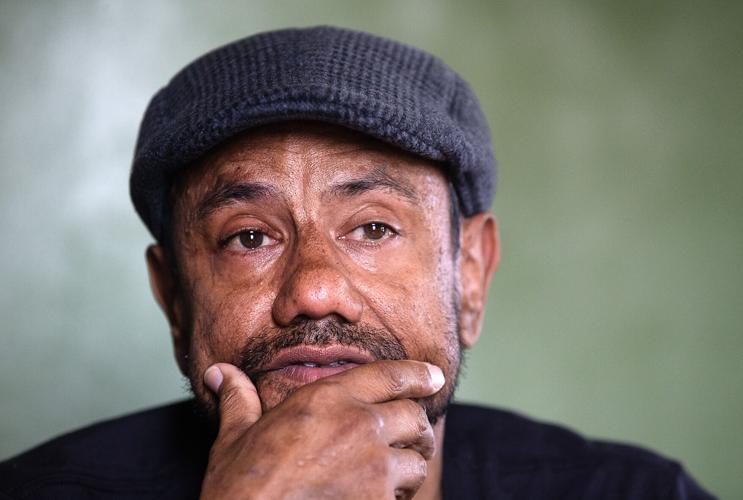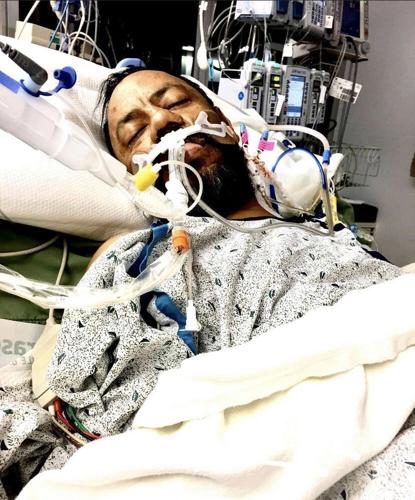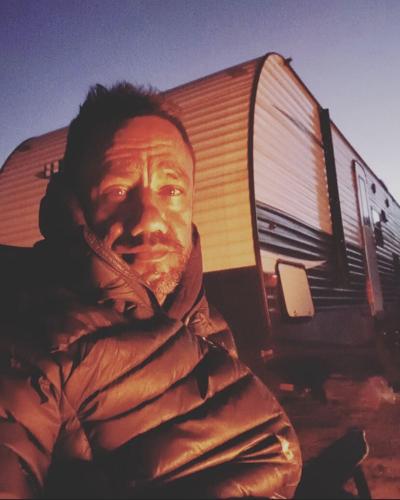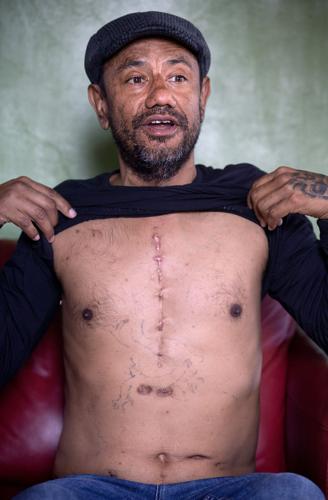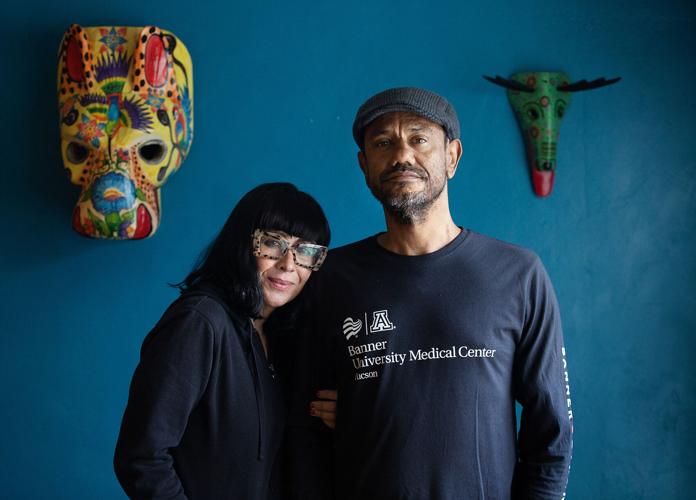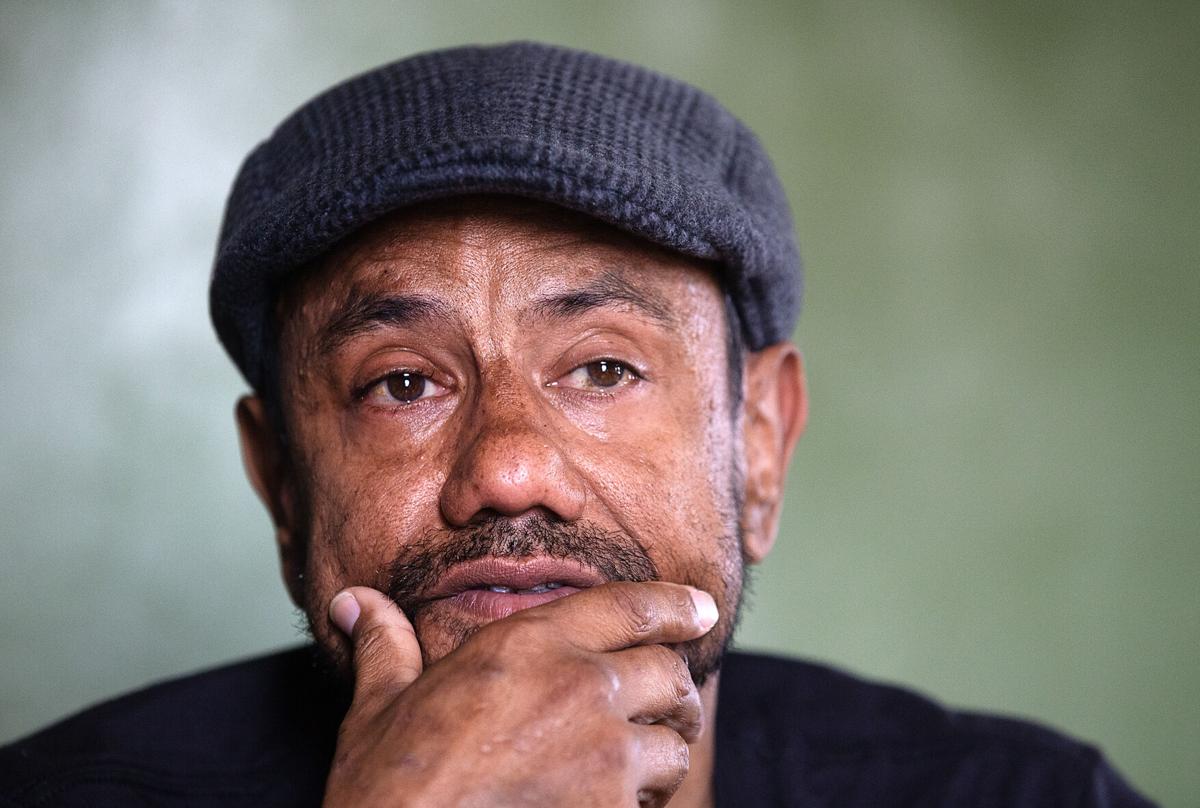It was nearly midnight when Mike Narvaez turned his camper into the parking lot of the Marana Cracker Barrel along Interstate 10.
He had been traveling for days, distancing himself from Pennsylvania’s freezing rain and the television images of makeshift morgues outside New York’s hospitals.
“It was me feeling this need to get away from this virus,” he said. “I literally started to mentally lose it.”
Narvaez’s kidneys were not working, and the COVID-19 pandemic’s devastation was gripping the country. He felt very vulnerable. And, for reasons he can’t explain easily, Tucson seemed a good place to go.
The night skies, the dry air, the sunshine. All of that. But mostly, he hoped, “there was some magic in the air.”
At morning light that first day, in November 2020, Narvaez fondly remembers seeing the Santa Catalina Mountains for the first time.
What’s happened since, he says, saved his life.
Deteriorating health
Narvaez was 19 the first time he heard about his kidneys. There were traces of protein in his urine, a doctor told him after a physical. Best to keep an eye on things. But, feeling as many do in their teens and early 20s, Narvaez thought himself invincible.
He did not consider his kidneys again until he was 29, when he learned those bean-shaped organs that filter blood and balance fluids were not functioning as they should.

Michael Narvaez with his camper at Snyder Hill's dispersed BLM camping, west of Tucson.
However, it was another handful of years before, as he puts it, “things got real.”
Narvaez, 48, is a musician. Born in Manhattan, his parents are from the Bronx, and his father, originally, is from Puerto Rico. He is an enthusiast, a guitarist who opened for bands like KISS, Great White, and the Kinks. He has taught guitar and vocal techniques.
In the midst of all that living and all that music, he said, the kidney problem did not seem real.
In hindsight, though, he sees that as his health deteriorated, denial was, increasingly, how he coped.
‘Gotta get to Tucson’
When Narvaez set out for Tucson just over two years ago, he traveled in what he fondly calls the “tin can” he bought in Pennsylvania with the last of his savings.
“I knew I could get a camper and go just about anywhere, and survive,” he said.
But survival for Narvaez in 2020 was not just dependent on his outdoor skills; he had to set up dialysis treatments to clean his blood and clear fluids along the way. He was welcomed at clinics in Indiana and St. Louis, but his reservation in New Mexico was canceled because of COVID-19 infections.
As Narvaez drove on, he was desperate and just kept repeating, “I’ve gotta get to Tucson, I’ve gotta get to Tucson.”
He arrived waterlogged from so much excess fluid in his body. He was having trouble breathing.
“I almost died getting here,” he said.
But he had a spot waiting for him at a dialysis clinic, guaranteed help, and so began what he now thinks of as his Tucson journey.
His last dollar
Brisa Gutierrez is a lifelong Tucsonan, a high school teacher whose online dating profile grabbed Narvaez. The two met, online, and really clicked.
On their first date, in November 2021, he was wearing white joggers, white Nike Air Max sneakers, and a gold chain. Gutierrez remembers that fondly, the “Puerto Rican city boy” attire. She has since encouraged him to adopt a more West Coast aesthetic: linen, sliders, breathable clothing.
He was charming, smart, and funny, she said. What she didn’t know, at least initially, was that he was living on public lands in his camper, with no heat and no cooling, and barely getting by.
“I didn’t know it was his last dollar,” she said of their date. “He swept me off my feet with his last dollar.”
Before their second date, he sold his watch so he could buy her flowers. But Narvaez knew he couldn’t keep up the facade.
“I really liked her, and I’m going to have to tell her all this stuff,” he said. “She’s a teacher. She’s a respectable woman. I’m a desert dweller on dialysis.”
Gutierrez wasn’t fazed.
“I was very shocked and touched by his selflessness, and desire to impress and woo me even at the cost of his own personal sacrifice,” she said. “I didn’t run because of his sincerity, honesty and his ability to not allow the disease to rule his life. The qualities that Mike has at his worst are 10 times better than most men at their best.”

Michael Narvaez after open-heart surgery last March at Tucson Medical Center.
A very long time
Amanda Dean met Narvaez at Fresenius Kidney Care East more than two years ago.
“He was very sick,” said Dean, a licensed master social worker with two Tucson Fresenius clinics. “He’d been on dialysis about 12 years. That’s a very long time.”
Narvaez was tired of being so sick, she said, and he didn’t have much hope things could improve. As a result, he wasn’t always taking his medications on time, she said, and he didn’t always follow a proper diet.
Back in Pennsylvania, Narvaez said, the transplant topic had come up, but he initially didn’t feel ready. Over time, when he felt more open to it, he had disappointing responses. In the end, he was told that if he wanted a transplant, he’d need to “get his act together.”
Then the pandemic hit.
It was out here in Tucson that Narvaez got it together, with help from Dean and her colleagues. They were kind, he said, and they were persistent.
“He’d been through a number of providers, and I think that played into it,” Dean said. Over time, she said, “he turned into a completely different patient.”
Dedicated, eager to get well. He was otherwise a strong person, quite young for end-stage renal failure, and that made him a good candidate for a transplant. The other factor that bolstered his chances: He had been on dialysis a long time, and that made getting a new organ more urgent.
Chronic kidney disease, according to the Centers for Disease Control and Prevention, by current estimates is more common in people 65 and older, at 38%, than in people 45 to 64, at 12%, or 18-24, at 6%.
However, in spite of these advantages, there were still challenges ahead.
One of the first steps toward becoming a kidney transplant recipient is making sure the heart is working well. Narvaez’s heart didn’t check out, not surprising after all those years of kidney failure and dialysis.
Blood was blowing back the wrong direction through his heart’s mitral and tricuspid valves, he said, and he had severe regurgitation.
Narvaez said a heart surgeon with Tucson Medical Center encouraged him to fix his heart so he could move on to a transplant list. He was young enough, and strong enough, to get through it, the surgeon told him.
And so, in March 2022, he underwent open-heart surgery.
Afterward, he felt well enough to start a new job and began driving a taxi. In no time, Gutierrez marveled, he had learned more street names than she knew after a lifetime of living here. He is currently employed in patient transport for Banner Health.
By last fall, after a false scare that he had cancer, he was on the list.

Michael Narvaez shows his scars from open-heart surgery and a kidney transplant as he recovers at his girlfriend's home in Tucson.
Friendly, positive, kind
In December, right around Christmas, the kidney transplant happened. (Donor details are being kept private out of respect for the donor’s family).
Dean, Narvaez’s social worker, was elated when she heard the news.
“That was always our goal, that he could get a transplant,” Dean said. “We worked really, really hard for that, and it took us almost two years.”
Narvaez says it’s hard to reconcile the person he is today with the person he was just a year or two ago.
“I should be dead,” he said. “I should not be sitting here.”
He credits the staff and surgeons at Tucson Medical Center and Banner-University Medical Center Tucson, where the transplant was performed, with saving him, his Christian faith with providing him the strength to persevere, and to change.
And there are others: Gutierrez, along with her parents, have provided a “safe haven” for his recovery.
They are, he said, among his Tucson angels.
Some of those angels played brief roles. For a while, for example, he parked the tin can at the Prince of Tucson RV Park. He was just barely hanging on, but he remembers fondly the kindness of the manager.
That woman, Rhonda Spencer, also remembers him well for two reasons: His skin was a bluish-gray color because he was so sick and that, despite that, he was often quite upbeat.
“The biggest thing I remember is how sick he was, but also that he never complained,” she said. “He was friendly, positive, kind.”
Spencer held his mail there for a while, after he could no longer afford to stay and had moved out to public lands.
Narvaez remembers those days fondly now, even though they were challenging. He says he would not change a thing about his last few years.
“It turned me into a better person,” he said. “I want to tell my story to offer hope.”

Michael Narvaez and his girlfriend, Brisa Gutierrez, at her home in Tucson.
A kidney transplant is a procedure where a new donor kidney is placed in your body. This is typically done because of kidney failure. Once attached, your new kidney will start to do the job of the failing organ. In this video, Dr. Richard Fatica, a nephrologist, explains the kidney transplant procedure.
Photos: UA campus and Tucson in 1965
1965 in Tucson
Updated
The Western movie classic "El Dorado," starring John Wayne, was filmed at Old Tucson in 1965. Courtesy of Old Tucson Studios.
1965 in Tucson
Updated
The adobe church at Old Tucson movie studio under construction on September 28, 1965.
1965 in Tucson
Updated
Finalists for the 1965 University of Arizona Homecoming Queen. The theme was "74 Years with the Right Women." Emily Sult, seated at right, was elected Queen.
1965 in Tucson
Updated
The Fox Theatre on Congress Street in downtown Tucson in June, 1965, prior to a massive urban redevelopment project that changed the area forever. Tucson Citizen
1965 in Tucson
Updated
Barry Goldwater, 1964 GOP presidential candidate, addresses a crowd of about 1,400 Tucson Republicans at a Lincoln Day dinner at the Ramada Inn on Feb. 11, 1965. He asked them to work toward party unity. Jon Kamman / Tucson Citizen
1965 in Tucson
Updated
The first four-mile stretch of the Nogales Interstate Highway opened to local traffic in March, 1965. This view of the new expressway is from Irvington Road north toward downtown Tucson. "A" Mountain is on the left. This first phase of the interstate, costing $3 million, was from I-10 to Valencia Road. Bruce Hopkins / Tucson Citizen
1965 in Tucson
Updated
The $1 million in bond funds recommended for street lighting would put lights like these on East Speedway in March, 1965, on about 20 miles more of busy arterial streets in Tucson. Tucson Citizen
1965 in Tucson
Updated
An aerial of University of Arizona Band performing during a football game at Arizona Stadium in 1965. Tucson Citizen
1965 in Tucson
Updated
An Arizona Air National Guard F-100 fighter takes off from Tucson International Airport in June, 1965. Art Grasberger / Tucson Citizen
1965 in Tucson
Updated
Mrs. Albert Lanham of Evanston, Ill, takes a picture of her son Bruce and his wife during University of Arizona commencement on May 26, 1965. Photo by Mark Godfrey / Tucson Citizen
1965 in Tucson
Updated
Mrs. William Conley of Tucson gives her daughter Diana a big hug at University of Arizona commencement on May 26, 1965. Photo by Mark Godfrey / Tucson Citizen
1965 in Tucson
Updated
The University of Arizona band waits to play during commencement at Arizona Stadium on May 26, 1965. Photo by Mark Godfrey / Tucson Citizen
1965 in Tucson
Updated
University of Arizona students file into Arizona Stadium for the 70th commencement on May 26, 1965. The Tucson Citizen said 2,710 students received degrees. Photo by Mark Godfrey / Tucson Citizen
1965 in Tucson
Updated
The University of Arizona Pompon girls at Arizona Stadium in October, 1965. Bruce Hopkins / Tucson Citizen
1965 in Tucson
Updated
University of Arizona 1965 Homecoming Parade float. Homecoming theme: "Seventy-four years with the right women." Tucson Citizen
1965 in Tucson
Updated
University of Arizona 1965 Homecoming Parade float. Homecoming theme: "Seventy-four years with the right women." Tucson Citizen
1965 in Tucson
Updated
University of Arizona 1965 Homecoming Parade float. Homecoming theme: "Seventy-four years with the right women." Tucson Citizen
1965 in Tucson
Updated
University of Arizona 1965 Homecoming Parade float. Homecoming theme: "Seventy-four years with the right women." Tucson Citizen
1965 in Tucson
Updated
University of Arizona 1965 Homecoming Parade float. Homecoming theme: "Seventy-four years with the right women." Tucson Citizen
1965 in Tucson
Updated
The message on this float, "Arizona's Finest Woman," in the 1965 UA Homecoming parade is anyone's guess.
1965 in Tucson
Updated
"74 Years of Sugar, Spice N' Everything Nice," float in the 1965 UA Homecoming Parade.
1965 in Tucson
Updated
Pulitzer Prize winning poet and playwright Archibald MacLeish spent several days at the University of Arizona in November 1965. He was a guest of the Ruth Stephan Poetry Center. Dan Tortorell / Tucson Citizen
1965 in Tucson
Updated
A model of the proposed new Pima County fairgrounds in March, 1965. It was moved from 6th Ave and Irvington to Houghton and I-10.
1965 in Tucson
Updated
Charles H. Schmid Jr., "The Pied Piper of Tucson," during a court appearance in Tucson in 1965. Schmid murdered three girls, one just to know what it felt like to kill someone. Arizona Daily Star
1965 in Tucson
Updated
Snow in El Encanto Estates, Tucson, on Feb. 10. 1965.
1965 in Tucson
Updated
A 1965 view of the proposed urban renewal area that included La Placita Plaza, Tucson Convention Center and Symphony Hall, Pima County Superior Court, and city, county and federal administration buildings. The view is from the then Tucson Federal Savings Tower. Art Grasberger / Tucson Citizen
1965 in Tucson
Updated
Nearly 1,000 University of Arizona students rioted on May 6, 1965, after male students demanded "panties" at women's dorms. Rocks and bottles were thrown. Sixteen students were arrested. Jon Kamman / Tucson Citizen
1965 in Tucson
Updated
Nearly 1,000 University of Arizona students rioted on May 6, 1965, after male students demanded "panties" at women's dorms. Rocks and bottles were thrown. Sixteen students were arrested. Jon Kamman / Tucson Citizen
1965 in Tucson
Updated
Nearly 1,000 University of Arizona students rioted on May 6, 1965, after male students demanded "panties" at women's dorms. Rocks and bottles were thrown. Sixteen students were arrested. Jon Kamman / Tucson Citizen
1965 in Tucson
Updated
Nearly 1,000 University of Arizona students rioted on May 6, 1965, after male students demanded "panties" at women's dorms. Rocks and bottles were thrown. Sixteen students were arrested. Jon Kamman / Tucson Citizen
1965 in Tucson
Updated
Sargent Shriver speaks at the National Conference on Poverty in the Southwest in Tucson on Jan. 25, 1965. Shriver was the founder of the Peace Corps and a force behind Pres. Johnson's "War on Poverty." Dan Tortorell / Tucson Citizen
1965 in Tucson
Updated
The University of Arizona College of Architecture building opened in 1965, Tucson Citizen
1965 in Tucson
Updated
The University of Arizona College of Architecture building opened in 1965, Tucson Citizen
1965 in Tucson
Updated
The University of Arizona College of Architecture building opened in 1965, Tucson Citizen


